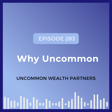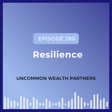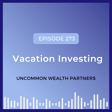
Advisors, Managers and Planners
In this episode of the Uncommon Wealth Podcast, co-hosts Phillip Ramsey and Arron Cramer delve into the complexities of portfolio management versus fund management, aiming to simplify these concepts for their listeners. Phillip and Arron discuss how Uncommon Wealth Partners uniquely positions itself in the financial planning industry, offering customized advice that aligns with each client's individual goals and risk tolerance.
The episode begins with Phillip introducing the topic of managing clients' money and the confusion surrounding different financial management terms. Aaron elaborates on the different titles financial professionals use, such as financial advisors, wealth managers, and fund managers, and what those titles signify about their service offerings. Together, they clarify that Uncommon Wealth Partners focuses on personalized financial planning and portfolio management. Phillip and Aaron emphasize the importance of understanding fees associated with financial services and how excessive charges can impact overall investment performance. Their goal is to provide clients with low-fee, high-value services that align with each client’s financial plan.
Key Takeaways:
- Understanding Financial Management Roles: Clear distinction between financial advisors, portfolio managers, and fund managers.
- Importance of Customized Financial Plans: Uncommon Wealth Partners prioritize personalized plans to align with clients' unique goals and risk tolerance.
- Fee Structures in Financial Services: Insight into different fees associated with fund management and the importance of transparent fee structures.
- Risk Tolerance and Portfolio Balance: The significance of balancing investments with different risk profiles to achieve financial goals.
- Client-Centric Approach: Emphasis on building long-term relationships with clients through transparency and personalized service.
Notable Quotes:
- "We do manage people's money. That's what we do here at Uncommon Wealth. We also give people customized plans for them to live their most uncommon life." - Phillip Ramsey
- "Investments are just a tool. Like, it's one tool of many. So with a plan, you really get to hound in." - Arron Cramer
- "Fees are a huge importance. Make sure that you know the fees that you are being charged." - Phillip Ramsey
- "We don't have a crystal globe knowing what's going to happen, so you got to diversify within there to meet and attack all those times and possibilities that could happen in the future." - Arron Cramer
- "We are in the business to get clients for life, and I think that we're doing a good job with that." - Phillip Ramsey
Resources:
- Uncommon Wealth Partners: uncommonwealth.com



















